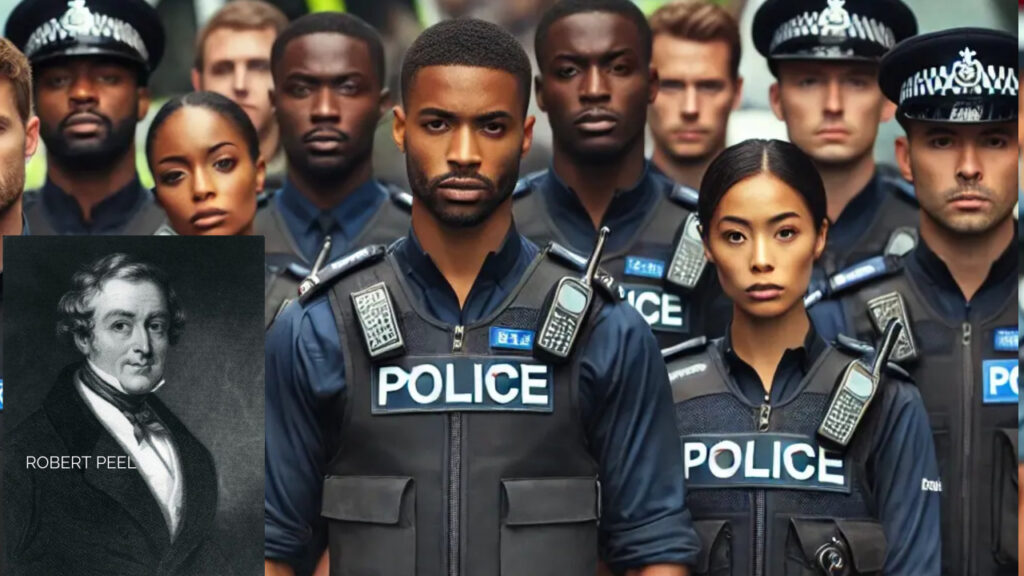If you visit many national policing websites, you will frequently find Robert Peel cited as the father of modern policing. His nine principles, established in 1829, continue to be referenced as the foundation of ethical law enforcement. However, regarding policing Black communities, these very principles have long been ignored. Instead of upholding the ideals of public trust, limited use of force, and impartial service, American policing has relied on a different historical framework—one rooted in the legacy of slave patrols, Black Codes, and Jim Crow laws. While Peel’s principles aimed to create a policing system based on cooperation rather than oppression, the reality for Black communities in America has been characterized by control, systemic racism, and an ongoing cycle of criminalization.
American policing today not only fails to uphold Peel’s ideals but was never genuinely aimed at applying them to Black communities. From the harsh enforcement of fugitive slave laws to contemporary racial profiling, police in the United States have operated with a racialized mandate that prioritizes surveillance and punishment over justice and service. While Peel envisioned a system where “the police are the public and the public are the police,” Black communities have instead faced a force that acts as an occupying power rather than a protector.
The contrast between Peel’s vision and the lived experiences of Black communities is stark. Below, I analyze each of Peel’s nine principles, revealing how law enforcement has ignored, undermined, and outright betrayed them regarding policing Black individuals in America.
Principle 1: Crime Prevention Over Punishment
Peel’s Principle: “The basic mission for which the police exist is to prevent crime and disorder, as an alternative to their repression by military force and severity of legal punishment.”
Reality in Black Communities:
Modern policing in Black neighborhoods has prioritized punitive enforcement over crime prevention. The so-called War on Drugs disproportionately targeted Black Americans, resulting in mass incarceration instead of addressing the root causes of crime, such as poverty, inadequate educational opportunities, and systemic disinvestment in Black communities. Rather than preventing crime through social programs, law enforcement has frequently relied on aggressive enforcement tactics, perpetuating a cycle of criminalization instead of ensuring community safety.
Principle 2: Public Trust as the Source of Police Power
Peel’s Principle: “The ability of the police to perform their duties is dependent upon public approval of police actions.”
Reality in Black Communities:
Trust between law enforcement and Black Americans has been undermined by centuries of racial profiling, excessive force, and police killings of unarmed Black individuals. The deaths of people like George Floyd, Breonna Taylor, and Tamir Rice have only intensified the distrust. Police departments often operate with a sense of impunity, shielding officers from accountability. When communities lack trust in the police, cooperation diminishes, making effective law enforcement nearly impossible.
Principle 3: Securing Willing Cooperation Over Force
Peel’s Principle: “Police must secure the willing cooperation of the public in voluntary observance of the law to be able to secure and maintain the respect of the public.”
Reality in Black Communities:
Instead of securing cooperation, policing has often relied on intimidation, violence, and fear. Tactics like stop-and-frisk, racial profiling, and heavy-handed policing of minor offenses have alienated Black citizens. The over-policing of minor infractions, such as selling loose cigarettes (Eric Garner) or minor traffic violations (Sandra Bland), has created a system where Black people often fear police rather than see them as allies in law enforcement.
Principle 4: Reducing the Need for Force Through Public Cooperation
Peel’s Principle: “The degree of cooperation of the public that can be secured diminishes proportionately to the necessity of the use of physical force and compulsion for achieving police objectives.”
Reality in Black Communities:
Police in Black communities are far more likely to use physical force than in predominantly white neighborhoods. Data consistently shows that Black individuals are more likely to be stopped, searched, arrested, and subjected to police violence more than white individuals for similar situations. behaviors. Instead of fostering cooperation, this aggressive approach exacerbates tensions, making force a self-perpetuating necessity rather than a last resort.
Principle 5: Absolute Impartiality and Fairness
Peel’s Principle: “Police seek and preserve public favor not by pandering to public opinion but by constantly demonstrating absolute impartial service to the law.”
Reality in Black Communities:
Policing has been far from impartial. The racial disparities in arrests, sentencing, and police stops highlight a justice system that disproportionately criminalizes Black people. White individuals committing the same offenses often receive lighter treatment, as seen in how white mass shooters are often apprehended alive, while unarmed Black individuals are killed for minor infractions or mere suspicion. This selective enforcement erodes any notion of fairness and justice in the Black community.
Principle 6: Minimal Use of Force
Peel’s Principle: “Police use physical force only when persuasion, advice, and warning are found to be insufficient to obtain public cooperation.”
Reality in Black Communities:
The police have failed to adhere to this principle, especially in their interactions with Black individuals. The killing of unarmed Black people by law enforcement has become a troubling trend, with officers often resorting to deadly force instead of seeking de-escalation. Even minor offenses, such as selling CDs (Alton Sterling) or reaching for identification (Philando Castile), have led to fatal outcomes. The excessive use of force, particularly against Black individuals, fundamentally undermines this principle.
Principle 7: The Police Are the Public, and the Public Are the Police
Peel’s Principle: “Police, at all times, should maintain a relationship with the public that gives reality to the historic tradition that the police are the public and the public are the police.”
Reality in Black Communities:
Rather than being seen as part of the community, police often function as an occupying force in Black neighborhoods. The racial composition of many police departments does not reflect the communities they serve, leading to an “us vs. them” mentality. The deployment of military-grade weapons, riot gear, and aggressive policing strategies further separates law enforcement from the people they are meant to serve.
Principle 8: Police Must Not Act as Judge and Jury
Peel’s Principle: “Police should always direct their action strictly towards their functions and never appear to usurp the powers of the judiciary.”
Reality in Black Communities:
Police often operate as judge, jury, and executioner in Black neighborhoods. Many Black individuals never see their day in court because they are killed during police encounters. The presumption of innocence is rarely extended to Black individuals, as officers frequently justify lethal force by claiming they feared for their lives—a defense that seldom holds when white suspects are involved. This blatant violation of Peel’s principle has resulted in a lack of due process and has perpetuated systemic racial injustice.
Principle 9: Police Success Is Measured by the Absence of Crime, Not Visible Force
Peel’s Principle: “The test of police efficiency is the absence of crime and disorder, not the visible evidence of police action in dealing with it.”
Reality in Black Communities:
Policing in Black neighborhoods is often evaluated by arrest rates, conviction rates, and aggressive tactics rather than by genuine safety. High incarceration rates do not reflect effective policing; instead, they highlight a system that criminalizes Black lives. Rather than effectively reducing crime through community engagement, social investment, and economic opportunities, the police have prioritized aggressive enforcement, creating a pipeline to prison that fails to tackle the root causes of crime.
Robert Peel’s principles were meant to create a policing system rooted in trust, fairness, and the minimization of force. However, in Black communities, these principles have been systematically violated. The relationship between the police and Black America is one of distrust, fear, and deep-seated injustice.
If law enforcement is to align with Peel’s ideals, radical reform is essential. Policing must shift from militarization and aggressive enforcement to a model that prioritizes public trust and safety. Officers who breach public trust must be held accountable, ensuring that the law applies equally to all citizens. Community-led policing, where officers are integrated into the neighborhoods they serve rather than functioning as an occupying force, must become the standard, not the exception. Furthermore, meaningful change requires investment in social services, education, and economic opportunities that tackle the root causes of crime rather than criminalizing poverty and racial identity.
Community empowerment is essential for this transformation. As taxpayers, people fund police departments, covering officers’ salaries, benefits, and resources. This financial authority must translate into genuine influence over policing policies and practices. Communities should demand transparency, participate in police oversight boards, and advocate for reforms that prioritize public safety over aggressive enforcement. Peel’s vision of policing is rooted in the belief that the police are the public, and the public are the police—this means that communities must act to reclaim their rightful role in shaping law enforcement.
But empowerment doesn’t stop there. People must also exercise the power of their vote. If your police commissioner lacks the guts to reform the culture of your police department, they must be removed—either through elections or by the mayor. If your police commissioner answers to the mayor, and the mayor refuses to hold them accountable, then the mayor must also be voted out. As the saying goes, you get the government you vote for. The authority to shape how your community is policed rests in your hands. True change won’t come from empty promises or symbolic gestures, but from active civic engagement, voter participation, and a steadfast demand for justice. Until these changes are made, Peel’s vision will remain an unfulfilled promise for Black communities—a promise that was never genuinely honored in the first place.

